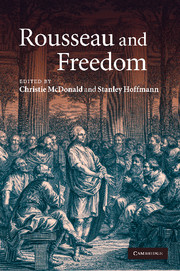Book contents
- Frontmatter
- Contents
- List of illustrations
- Notes on contributors
- Acknowledgments
- List of abbreviations
- Introduction
- PART I
- 1 Freeing man from sin: Rousseau on the natural condition of mankind
- 2 Making history natural in Rousseau's Discourse on the Origins of Inequality
- 3 Rousseau's Second Discourse: between Epicureanism and Stoicism
- 4 Jean-Jacques Rousseau and Diderot in the late 1740s: satire, friendship, and freedom
- 5 If you please! Theater, verisimilitude, and freedom in the Letter to d'Alembert
- 6 Music, the passions, and political freedom in Rousseau
- PART II
- PART III
- Bibliography
- Index
6 - Music, the passions, and political freedom in Rousseau
Published online by Cambridge University Press: 05 May 2010
- Frontmatter
- Contents
- List of illustrations
- Notes on contributors
- Acknowledgments
- List of abbreviations
- Introduction
- PART I
- 1 Freeing man from sin: Rousseau on the natural condition of mankind
- 2 Making history natural in Rousseau's Discourse on the Origins of Inequality
- 3 Rousseau's Second Discourse: between Epicureanism and Stoicism
- 4 Jean-Jacques Rousseau and Diderot in the late 1740s: satire, friendship, and freedom
- 5 If you please! Theater, verisimilitude, and freedom in the Letter to d'Alembert
- 6 Music, the passions, and political freedom in Rousseau
- PART II
- PART III
- Bibliography
- Index
Summary
Political thought is representative. I form an opinion by considering a given issue from different viewpoints, by making present to my mind the standpoints of those who are absent; that is, I represent them. This process of representation does not blindly adopt the actual views of those who stand somewhere else, and hence look upon the world from a different perspective; this is a question neither of empathy, as though I tried to be or to feel like somebody else, nor of counting noses and joining a majority but of being and thinking in my own identity where actually I am not. The more people's standpoints I have present in my mind … the stronger will be my capacity for representative thinking.
Hannah ArendtArendt draws here upon the concept of “reflective judgment” in Immanuel Kant's Critique of the Power of Judgment. “Reflective judgment” is precisely not my taking someone else's point of view, but thinking as myself (“thinking in my own identity”) that which others think. Such judgment thus re-presents the judgments of all those others to whom I make myself present. I will not necessarily agree with them, but I will have had them present while reflecting. In doing so, Arendt observes, I do not take into account “only my own interests.”
Yet, if Arendt is right, it would seem that there is no room for such a politics in Rousseau: notoriously, he seems opposed to representation as such.
- Type
- Chapter
- Information
- Rousseau and Freedom , pp. 92 - 110Publisher: Cambridge University PressPrint publication year: 2010
- 14
- Cited by

